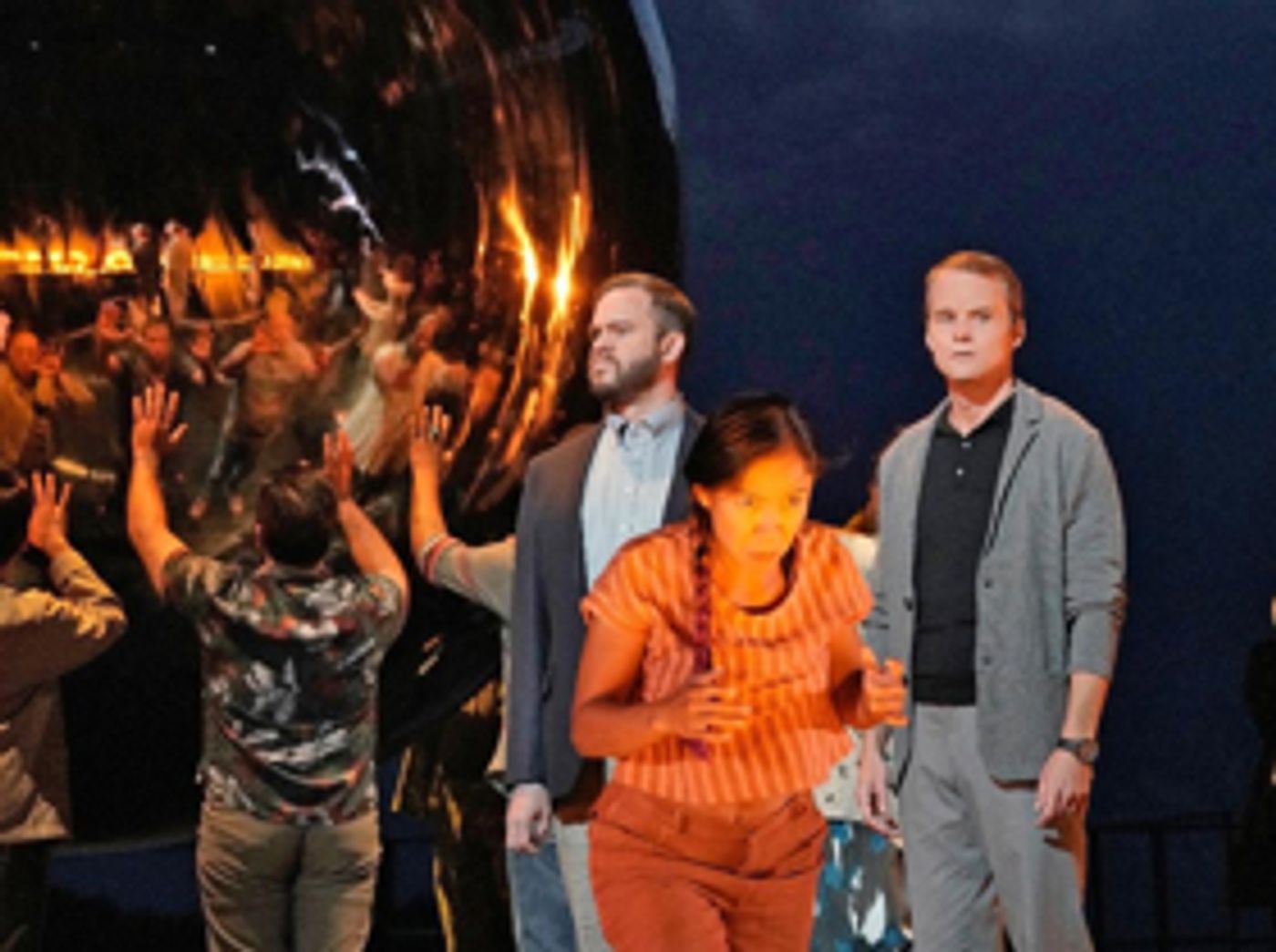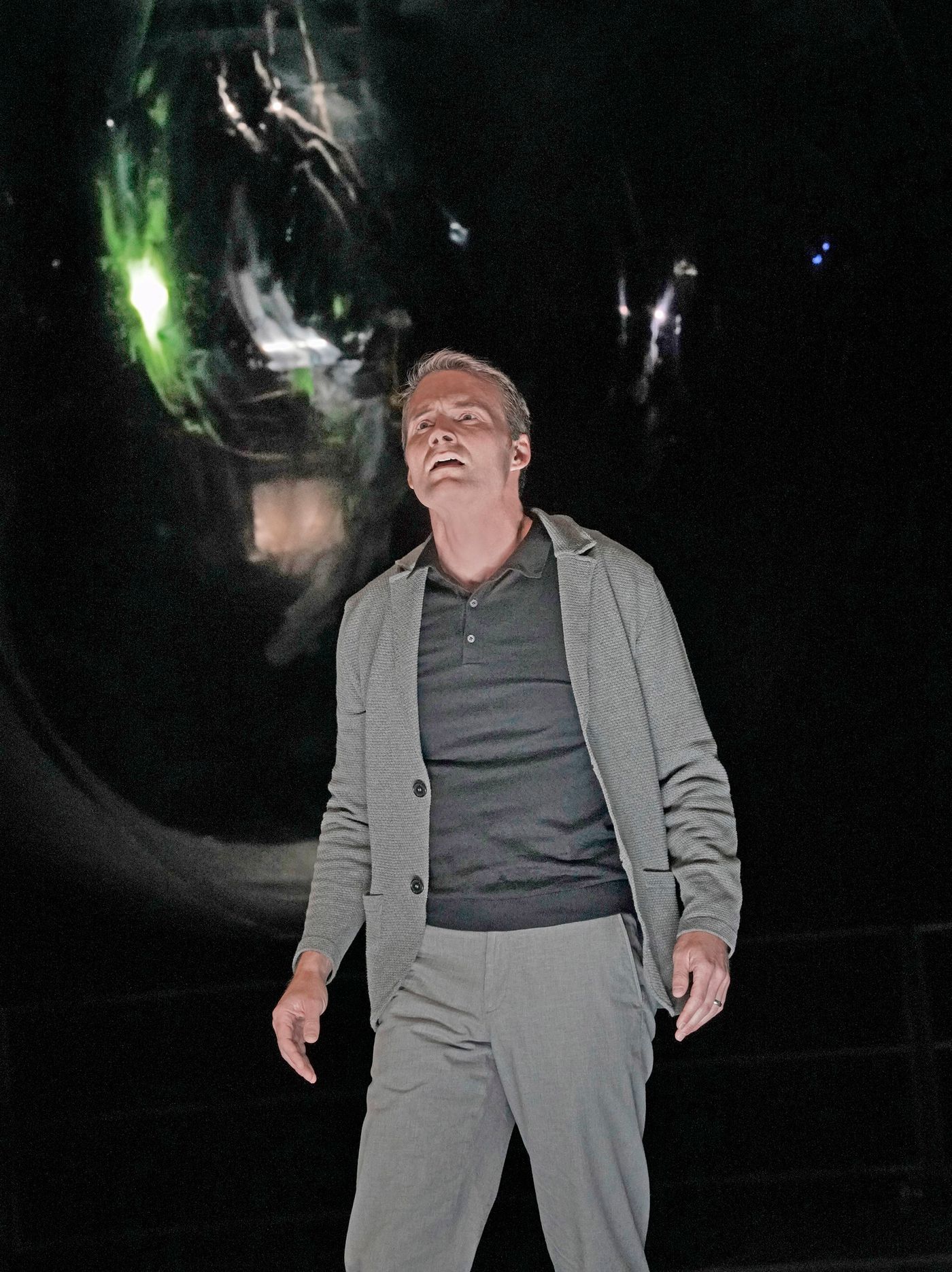Interview: Ryan McKinny of DR ATOMIC at Santa Fe Opera

 Ryan McKinny as Oppenheimer. Photo by Ken Howard for Santa Fe Opera.
Ryan McKinny as Oppenheimer. Photo by Ken Howard for Santa Fe Opera.
MN: Where are you from originally?
R McK: Los Angeles, CA
MN: Are there other musicians in your family?
RMcK: Both my parents studied classical guitar at the University of Southern California.
MN: Where did you study?
RMcK: First, I studied at Pasadena City College, then Cal State Northridge and after that at the Juilliard School.
MN: What instruments do you play?
RMcK: I play a little guitar, a little ukelele, and enough piano to plunk out my lines when I learn new roles.
MN: What artists or musicians from the past have significantly influenced you?
RMcK: So many, but the first person who comes to mind is Paul Robeson. He was the epitome of a Renaissance man: brilliant, athletic, highly educated, and an incredible actor and singer. He also sacrificed all of it to fight for what he believed was right. I find his story and his voice to be an incredibly deep source of inspiration.
MN: Who were your most important teachers?
RMcK: Donald Brinegar at Pasadena City College really gave me some incredible insights about music and my voice. Later, I made huge strides, vocally, with Vocal Instructor W. Stephen Smith at Juilliard and after that with Stephen King, Professor of Voice at Rice. I'd also say in addition, that both Houston Grand Opera Artistic and Music Director Patrick Summers and Coach Kathleen Kelly have had a huge impact on me musically. Stage Director and librettist of DR ATOMIC Peter Sellars really changed my perspective on the nature of art by indicating how deep and wide it can go.
MN: What did you learn from your teachers that you would like to pass on to the next generation of artists?
RMcK: So many things. One major item is authenticity. Authenticity relates specifically to one's individuality as a singer. It defines one's specific, unique voice and what makes the artist the person he or she is. The other thing I would like to pass on would be a way of looking at art that goes beyond the artist's ego. An artist should want to facilitate a connection between human beings, and endeavor to cultivate empathy both on a personal and a community level.
MN: What would you like operagoers to know about DR ATOMIC?
RMcK: I hope folks are able to arrive with an open heart and mind. As with any librettist Peter Sellars and composer John Adams collaboration, what we are creating is not traditional opera. In this case, it almost feels like a kind of ceremony-a celebration of this land and a display of mourning for what happened here in the desert 75 years ago.
MN: What is your understanding of Oppenheimer?
RMcK: I'll give a caveat, which is that, although I've done my research and read the biographies etc., I am not trying to recreate the historical figure of Robert Oppenheimer. What Peter and I are creating together is a person who is grappling with these questions now, in our times, since they are, in fact, timelessly difficult questions. Oppie's ability to synthesize this group of people in order to create this devastating weapon is a source of pride for him.
On the other hand, he knows deep down that what he is creating will kill millions of people. He has to convince himself that he is doing something good just to keep from having a breakdown, which he may or may not actually avoid. This moral crisis becomes a spiritual crisis. He wants to be on the side of God but finds himself estranged from the divine. The only person he can connect with honestly is also the most volatile, his wife, Kitty, and even that connection is strained.
On the day after the premiere of DR ATOMIC at Santa Fe Opera, Ryan wrote from Tesuque, NM:
One of my favorite moments of DR. ATOMIC actually occurs before the opera starts. As the dancers and singers from Tesuque, Santa Clara and Idelfonso Pueblos bless the performers and the audience with their voices and bodies, I sit on the ground just off stage and take it all in. I think about their ancestors and about the land we are on and what it means to be an artist, both for me and for them. I am deeply grateful for this gift. Besides the gift of their blessing, one of the pueblo singers, Erik James Fender (Than Tsideh), who makes jewelry and pottery, created a beautiful arrowhead necklace for me. Wearing it through the show last night, I felt protected and supported. I feel such gratitude to be here in this place, and with these people. Thank you all.
MN: What important performances do you have coming up this season and next?
RMcK: I'll sing my first Wotans, first in Aspen in a concert of DIE WALKÜRE, then in Montreal in fully staged performances of DAS RHEINGOLD. Also this season, I sing my first DON GIOVANNI. That will be in Houston. Later, I reprise the role of Clarence in Adams' GIRLS OF THE GOLDEN WEST in Amsterdam and I return to Bayreuth next summer for another production of Amfortas in PARSIFAL.
MN: Do you sing recitals?
RMcK: I do, but not as often as I'd like to!
MN: What have you recorded?
RMcK: I don't have any solo albums yet, but I have appeared on recordings of ORANGO with the LA Philharmonic Orchestra, GISEI with Deutsche Oper Berlin, and THE REFUGE with Houston Grand Opera.
MN: What are your thoughts on downloads vs. compact discs?
RMcK: I think downloads are great. I don't think I'd go back to CDs but sometimes I wish we would go back to both analogue recording and listening because the voice quality is so much better.
MN: What kind of music do you listen to for relaxation?
RMcK: Bluegrass is my go to when I'm in winding down mode.
MN: What do you see yourself doing five years from now?
RMcK: Who knows? Life is beautifully unpredictable!
MN: How much modern technology do you use in your work?
RMcK: I often use an iPad instead of a paper score since it's so much easier than hauling around the ten scores I'm working on at any given time.
MN: Do you ever have time for a private life?
RMcK: Absolutely. I have a wife, Tonya, and two kids, Emma and Louis, who are twelve and eight. They travel with me full time and we home school them, which is fun and difficult as well. I also find time to run, meditate, read, hike, and consider the big questions. The more time I can spend outside, the better. I also spend time trying to be an advocate for people that our society marginalizes, a theme that's becoming more and more important to me as an artist.
Andrew Harris, Ryan McKinny and Dancer in photo by Ken Howard for Santa Fe Opera
Videos

